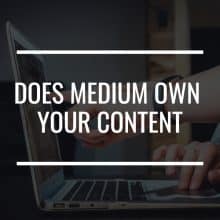

Medium is one of the top blogging platforms out there, and many aspiring bloggers are setting up shop on Medium because it’s free. It would seem like there’s virtually nothing to lose.
However, nothing is truly free in this world anymore. There’s always a catch.
So what actually happens when you create a blog on Medium?
Complying with Medium’s Terms & Conditions severely limits monetization options for your blog. If Medium decides that your blog post doesn’t meet their Terms & Conditions, they can delete it without your knowledge or permission at any time.
Although you do have some freedom to write about what you want, the anxiety of making one mistake that could lead to your content disappearing will always loom at the back of your mind.
Blog posts published on Medium can’t include any custom embedded call-to-actions (CTA) to join a newsletter, trial, or purchase a product. Sure, you could add a button that links to your site, but that creates an extra step that cuts down your conversion rate. You can forget about email pop-ups or landing pages that contain a lead magnet.
That doesn’t mean blog posts shouldn’t be written to be excellent and engaging, though.
The point of a blog is to acquire customers (just like any other business), and you won’t build a customer base with low quality content, even if you get started on a platform like Medium.
Tracking pixels is a crucial element to retarget ads and for conversion optimization. Not being able to include a strong CTA in your posts wouldn’t be a big deal if you could still add a tracking pixel to retarget your readers with ads – but you can’t.
Medium doesn’t allow it’s publishers to add custom code within the webpage to track readers and advertise directly to them, further devaluing the articles you publish through their platform.
Medium’s business model makes sense — they can’t afford tons of custom code breaking their site. But if you’re someone trying to build a blog business, this model isn’t the best fit.
Medium’s Terms of Service clearly states that “You retain your rights to any content you submit, post or display on or through the Services.”
HOWEVER, the section right after that line is bothersome.
Excerpt from Medium’s Terms of Service
When you publish content on Medium, you automatically allow the company to “modify, adapt, publish, translate” your content whenever and however they see fit.
So, to answer your question: yes, Medium does own your content. Sure, you get protection from international copyright laws, but at what price?
Overall, Medium is still a great platform. It wouldn’t be the success it is today if it were a horrible company. Medium is a good option for people with established blogs, and a useful extension to drive more traffic to an already existing website.
It’s difficult to use Medium as your main blogging platform since monetization options are heavily restricted.
If you desire creative freedom, a self-hosted blog is what you seek.
I've been in internet marketing for over 10 years, and I've purchased dozens of illegitimate products for the sole purpose of evaluating them and exposing the truth about these products to anyone who's thinking about purchasing it. I never let money influence my rating of a product and your success/safety is my absolute highest priority. Don't want to buy a product? Register for one of my 100% free internet marketing training courses>>